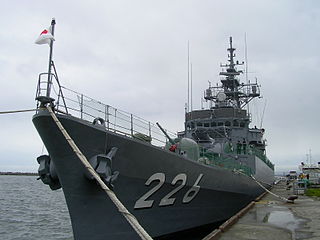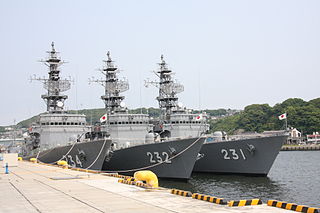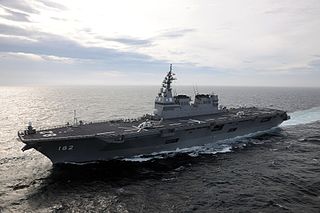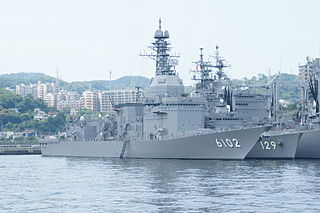
The Japan Maritime Self-Defense Force, also simply known as the Japanese Navy, is the maritime warfare branch of the Japan Self-Defense Forces, tasked with the naval defense of Japan. The JMSDF was formed following the dissolution of the Imperial Japanese Navy (IJN) after World War II. The JMSDF has a fleet of 154 ships, 346 aircraft and 50,800 personnel.

The Murasame-class destroyer is a class of destroyers, serving with the Japan Maritime Self-Defense Force (JMSDF). This is the first class of the second-generation general-purpose destroyers of the JMSDF.

The Asagiri-class destroyer is a class of destroyer, serving with the Japan Maritime Self-Defense Force (JMSDF). It was the second class of first generation general-purpose destroyers of the JMSDF.

The Yamagumo class are vessels of the Japanese Maritime Self-Defense Force, usually classified as a destroyer, but due to their relatively light displacement, in other sources as a destroyer escort. This class is the successor of the Akizuki class.

JS Ishikari (DE-226) was the first destroyer escort with a gas turbine engine and surface-to-surface missiles of the Japanese Maritime Self-Defense Force. She is the successor of the earlier Chikugo class. Entering service in 1981, she remained active until 2007 when she was decommissioned.

The Abukuma-class destroyer escort is the general-purpose destroyer escort of the Japan Maritime Self-Defense Force. It is the successor of the earlier Yūbari class.

The Hyūga-class helicopter destroyer is a class of helicopter carrier built for the Japan Maritime Self-Defense Force (JMSDF). Two - Hyūga and Ise - were built; upon completion the class were the largest ships built for the Japanese navy since the Second World War. Hyūga was described in a PBS documentary as the "first Japanese aircraft carrier built since WWII."

The Akizuki class of destroyers of the Japan Maritime Self-Defense Force is intended to escort the Hyūga-class and Izumo-class helicopter destroyers, and safeguard the other Aegis-capable warships such as the Kongō class and Atago class. The destroyer provides defense against surface, airborne and undersea threats. The class was initially designated as "19DD", referring to a date on the Japanese calendar, specifically the 19th fiscal year of the Heisei period (2007).

JS Hyūga (DDH-181) is the lead ship of the Hyūga-class helicopter destroyers of the Japan Maritime Self-Defense Force (JMSDF).

JS Ise (DDH-182) is a Hyūga-class helicopter destroyer of the Japan Maritime Self-Defense Force (JMSDF). It is the second ship to be named Ise, the first being the Imperial Japanese Navy World War II-era battleship Ise.

FCS-3 is an integrated naval weapons system developed by the Japanese Defense Ministry for the Japan Maritime Self-Defense Force.

JS Asuka (ASE-6102) is an experimental ship of the Japan Maritime Self-Defense Force. The vessel was constructed by Sumitomo Heavy Industries of Tokyo, Japan and was launched on 21 June 1994. Asuka was commissioned on 22 March 1995 and since then has conducted performance confirmation tests for integrated navigation systems.

OPS-14 is a two-dimensional radar manufactured by Mitsubishi Electric. It is mainly mounted on the Maritime Self-Defense Force's self-defense ship as an anti-aircraft search radar. Variations include OPS-14B and OPS-14C.

OPS-11 is a two-dimensional radar manufactured by Mitsubishi Electric. It is installed as an anti-aircraft search radar on the Maritime Self-Defense Force's escort ship, and it will be the first model originally developed by Japan after World War II for this purpose. Variations include OPS-11B and OPS-11C.

OPS-18 is a two-dimensional radar manufactured by Japan Radio Company. It is installed as an anti-water search radar on the Maritime Self-Defense Force's escort ship. Variations include OPS-18-1 and OPS-18-3.

OPS-9 is a two-dimensional radar manufactured by Fujitsu. It is installed as an anti-water search radar on the Maritime Self-Defense Force's escort ship. Variations include OPS-9B and OPS-9C.

OPS-28 is a Pulse-Doppler radar manufactured by Japan Radio. It is installed as a low-altitude warning / anti-water search radar mainly on the Maritime Self-Defense Force's escort ship. Variations include OPS-28-1, OPS-28B, OPS-28C, OPS-28D, OPS-28E and OPS-28F.

AN/SPS-6 is a two-dimensional radar manufactured by Bendix and Westinghouse Electric. It was used by the US Navy as a first-generation air-search radar after World War II, and was widely exported to allies. In addition, the improved AN/SPS-12 is the derivative types developed in other countries.

OPS-4 is a two-dimensional radar manufactured by Oki Electric Industry. It was installed as surface-search radar on the Maritime Self-Defense Force's self-defense ship.

AN/SPS-10 is a two-dimensional radar manufactured by Raytheon Technologies. It was used by the US Navy as a surface-search radar after World War II, and was equipped aboard naval ships during the Cold War. Variants include AN/SPS-10B, AN-SPS/10E and AN/SPS-10F.
























